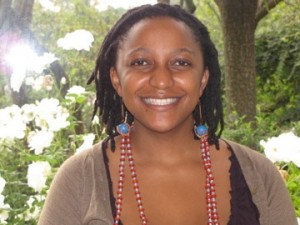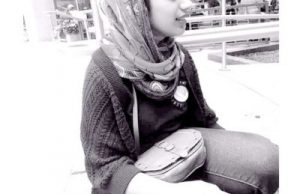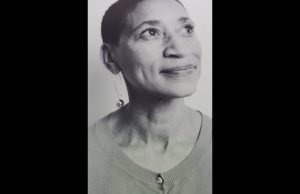Sisters in Struggle: An Ode of Love
By Mazuba Haanyama
In tribute to the life and legacy of Assata Shakur, we commune here, sisters bound in struggle, reflecting on the myriad of struggles we continue to traverse in our individual and collective lives. I takethis time to reflect on the many struggles we fight, many silent, behind closed doors, with ourselves and others loudly, boldly against the oppressive forces we encounter and fight to dismantle.
The struggle for black freedom is often a struggle for our individual and collective survival. I think about how we as black women are so often denied the right to struggle for our own survival, putting the collective before ourselves and our needs. Being present for black liberation struggles requires we be present in our own lives; understanding that there is no difference between these things is the journey.
I think about how our sisters and mothers have fought battles over time and space so we may exist and how we continue to fight those battles ensuring our existence and that of our children. I am dizzy at the thought about how our disappearance is a real and active strategy against us, black women. I worry about the divisive mechanisms that are infiltrating our lives, ripping us apart from each other. We inhabit a world where sleeping with your best friend’s lover is nothing more than a friendly misdemeanour rather than a divisive act fragmenting our communities. We have to restore a sense of love and dignity for each other as black women, making paramount the respect for each other’s survival. I want to return to the sanctity of black sisterhood, where our care and love for ourselves and one another triumphs. Returning to a collective steeped in the tradition of love, care, and mutual respect, creating rituals for our practices, rituals that affirm our existence– this is necessary.
Working with young feminists across southern Africa has brought into bright focus the ways in which we have become divisive in our struggles. The dominant discourse is often about how we should be competing with one another as black women, competing for resources, men, money, and time. I have seen how books like Act Like a Lady, Think Like a Man have a glowing following, and yet it pits us up against one another, reasserts our fractures, and diminishes our collective power. I think about the ways in which our “work” has pigeonholed us into issue areas, having us believe there are real differences between struggles that converge on our bodies. By taking our struggles into organisations, I think we have lost some things. We have allowed our struggles to become mangled and donor driven. We have diluted the urgency with which we should be resisting. Relying on sponsored conferences to meet and strategise has compromised our collective resistance. I wonder how we return to putting our struggles at the centre, aligning our consciousness and time toward focused change.
Multigenerational dialogue, as a practice we require in sustaining our sisterhood, has been segmented into an issue area to be targeted project by project. Multigenerational dialoguing is necessary to our learning and being in the world. Sister Assata and many like her have walked these journeys so we may be led onto the battlefield with guiding light. I hope we take heed as we build upon that undertaken before us.
I take this moment to reflect on what sister Assata has taught and continues to teach us: to be brave against the onslaught of racist and sexist systems of oppression, to struggle with love in mind always and to recognise our enemy is not us, though some of us have been co-opted along the way. I live off of these teachings and others, reminding myself daily of sisters who are still in the trenches risking their lives with the vision of our liberation at heart. Sis Winnie Mandela reminds us to be fierce and that the enemy will spare no mercy in trying to discredit our achievements, but that our struggles are fought on many battlefields and, while engaged, we have to stay true and committed to our goals. Sis Amina Mama teaches us to fight for the space and right to honour the knowledge we produce as black women, understanding deeply that our lives are the foundation for this knowledge. Sis Doo Apane teaches us to stand firm our ground, even though it will be lonely a lot of the time. And to the thousands of other sisters whose names I have yet to memorise and carve into my consciousness, I feel a triumphant sense of community and love.
We fight against the constant encroaching of an imperialist agenda making its home in our lives, which would have us believe we are less than our fullness and if we tug at, stretch, and mangle one another, we may come out ahead. I especially love sisters “who fight the bellhooksian urge to kill motherfuckers who say stupid shit to us all day.” I stitch these tunes into the melody of my resistance. As Alexis Pauline Gumbs says, “survival references our living in the context of what we have overcome. Survival is life after disaster, life in honour of our ancestors, despite the genocidal forces worked against them specifically so we would not exist.” Ours is a survival and resistance against forces that try to disappear us.
These women remind us never to get used to the pervasive violence taking shape in our lives. They teach us to be outraged and to use this anger for change and healing. As yet another lesbian woman is raped and murdered in South Africa, may we embody these teachings and be outraged, remembering that violence against one is violence against us all.
My daily survival relies on sisterly bonds which honour my spirit, challenge my fears, and fundamentally scrunch up the strange in the world, making it bearable to my overly sensitive wisdom.
I am working on making these teachings practice, and as I do so, I remember to “kick it, regularly with my homegirls. This can be magic.”[1]
[1] http://www.crunkfeministcollective.com/2013/06/07/how-to-not-die-some-survival-tips-for-black-women-who-are-asked-to-do-too-much/
___________________________
 Mazuba Haanyama is a young writer, thinker and activist. She hails from Southern Africa, more specifically Zambia. She grew up in various countries around the world. Her childhood travels have significantly shaped her social and political views. Mazuba is passionate about the continent, young people and writing & performance. These passions shape much of her life’s trajectory. Mazuba holds a Masters Degree in Gender Studies from the African Gender Institute, UCT. Mazuba manages a poetry performance group, called Rite 2 Speak. She also co-founded a multi-media production company called Black Salt Productions. She currently lives in leafy Johannesburg and works at OSISA (Open Society Initiative for Southern Africa).
Mazuba Haanyama is a young writer, thinker and activist. She hails from Southern Africa, more specifically Zambia. She grew up in various countries around the world. Her childhood travels have significantly shaped her social and political views. Mazuba is passionate about the continent, young people and writing & performance. These passions shape much of her life’s trajectory. Mazuba holds a Masters Degree in Gender Studies from the African Gender Institute, UCT. Mazuba manages a poetry performance group, called Rite 2 Speak. She also co-founded a multi-media production company called Black Salt Productions. She currently lives in leafy Johannesburg and works at OSISA (Open Society Initiative for Southern Africa).




0 comments